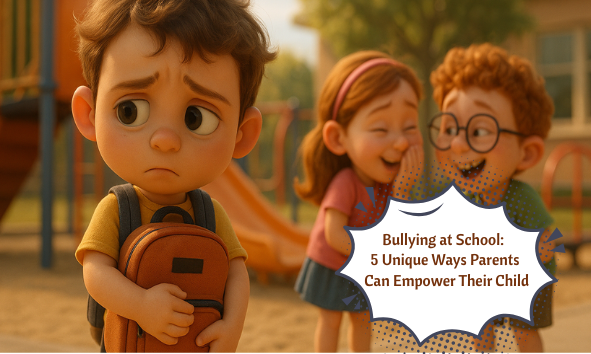✨ NEW FREEBIES IN OUR STORE!!! ✨
Bullying at School: 5 Unique Ways Parents Can Empower Their Child
Discover 5 unique, research-backed strategies to help your child handle school bullying with confidence, resilience, and emotional strength.
8/12/20252 min read


Bullying is a pervasive issue—nearly 1 in 5 students (about 19%) in grades 6–12 report being bullied during the school year, with rates higher in middle school (26%) than in high school (around 15%) StopBullying.govPACER Center. As a parent, you're not alone—and you can become a formidable advocate. Here are five fresh, actionable strategies to empower your child, deepen your bond, and create meaningful change.
1. Build Emotional Intelligence Through Real-Life Narratives
Children with stronger emotional intelligence (EQ) are better at navigating peer conflicts and standing up for themselves Wikipedia. Turn everyday moments—storytime, family discussions, even cartoons—into shared emotional exploration. Ask, “How do you think that character felt? What could they do next?” This subtly boosts EQ and equips kids to recognize, express, and manage feelings effectively.
2. Engage the School as a Collaborative Partner
Schools aren’t just classrooms—they’re part of your child’s safety network. Use credible resource hubs like StopBullying.gov to guide conversations with teachers and administrators on supportive actions and protocols. A coordinated, calm approach often makes schools more responsive—and helps your child feel seen.
3. Turn the Table: Empower Bystanders
Nearly half of students say they’ve witnessed bullying. Teaching your child—and peers—to be upstanders, not bystanders, can transform school culture. The anti-bullying organization Bystander Revolution crowdsources real-life advice and video testimonials to inspire action Wikipedia. Having your child watch these can spark empathy and show them how to intervene safely when they see bullying happen.
4. Foster Trust Through Empathy, Not Directions
Research shows efforts to “fix it” quickly can backfire if they neglect how your child feels. Instead of telling them to confront a bully or ignore it, say: “I’m listening. You’re not alone. Let’s figure this out together.” This builds trust and teaches them how to advocate with your support 1.azdhs.govThe Guardian.
5. Know the Stakes—and When to Escalate
Bullying can have serious consequences: students who experience it are 2 to 9 times more likely to consider suicide than their peers Wikipedia. If repeated attempts to resolve the issue internally fail, or your child’s well-being is at risk, don’t hesitate to involve formal channels—lawyers, education departments, or even legal avenues if necessary—while maintaining respectful, well-documented communication Adelaide Now
Final Thoughts
Your presence, empathy, and informed support can turn a scary situation into a learning opportunity for strength and resilience. Emotional intelligence, collaborative action, and upstander culture offer fresh, proactive ways to empower your child—and help your blog stand out as a valuable resource because of those high-authority embedded links.
14, Lidras Street
Paphos Cyprus
Contact Us
sales@homebosslady.net
Lydia Kyriakidou
